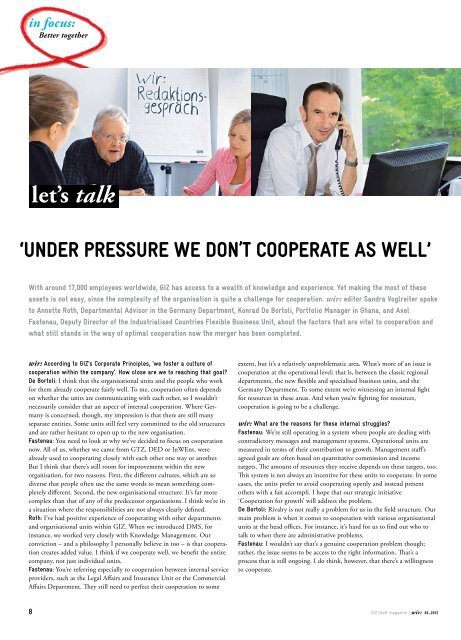03-wir-03-2012-english
You also want an ePaper? Increase the reach of your titles
YUMPU automatically turns print PDFs into web optimized ePapers that Google loves.
in focus:<br />
Better together<br />
let’s talk<br />
‘Under pressure we don’t cooperate as well’<br />
With around 17,000 employees worldwide, GIZ has access to a wealth of knowledge and experience. Yet making the most of these<br />
assets is not easy, since the complexity of the organisation is quite a challenge for cooperation. <strong>wir</strong>: editor Sandra Voglreiter spoke<br />
to Annette Roth, Departmental Advisor in the Germany Department, Konrad De Bortoli, Portfolio Manager in Ghana, and Axel<br />
Fastenau, Deputy Director of the Industrialised Countries Flexible Business Unit, about the factors that are vital to cooperation and<br />
what still stands in the way of optimal cooperation now the merger has been completed.<br />
<strong>wir</strong>: According to GIZ’s Corporate Principles, ‘we foster a culture of<br />
cooperation within the company’. How close are we to reaching that goal?<br />
De Bortoli: I think that the organisational units and the people who work<br />
for them already cooperate fairly well. To me, cooperation often depends<br />
on whether the units are communicating with each other, so I wouldn’t<br />
necessarily consider that an aspect of internal cooperation. Where Germany<br />
is concerned, though, my impression is that there are still many<br />
separate entities. Some units still feel very committed to the old structures<br />
and are rather hesitant to open up to the new organisation.<br />
Fastenau: You need to look at why we’ve decided to focus on cooperation<br />
now. All of us, whether we came from GTZ, DED or InWEnt, were<br />
already used to cooperating closely with each other one way or another.<br />
But I think that there’s still room for improvement within the new<br />
organisation, for two reasons. First, the different cultures, which are so<br />
diverse that people often use the same words to mean something completely<br />
different. Second, the new organisational structure. It’s far more<br />
complex than that of any of the predecessor organisations. I think we’re in<br />
a situation where the responsibilities are not always clearly defined.<br />
Roth: I’ve had positive experience of cooperating with other departments<br />
and organisational units within GIZ. When we introduced DMS, for<br />
instance, we worked very closely with Knowledge Management. Our<br />
conviction – and a philosophy I personally believe in too – is that cooperation<br />
creates added value. I think if we cooperate well, we benefit the entire<br />
company, not just individual units.<br />
Fastenau: You’re referring especially to cooperation between internal service<br />
providers, such as the Legal Affairs and Insurance Unit or the Commercial<br />
Affairs Department. They still need to perfect their cooperation to some<br />
extent, but it’s a relatively unproblematic area. What’s more of an issue is<br />
cooperation at the operational level; that is, between the classic regional<br />
departments, the new flexible and specialised business units, and the<br />
Germany Department. To some extent we’re witnessing an internal fight<br />
for resources in these areas. And when you’re fighting for resources,<br />
cooperation is going to be a challenge.<br />
<strong>wir</strong>: What are the reasons for these internal struggles?<br />
Fastenau: We’re still operating in a system where people are dealing with<br />
contradictory messages and management systems. Operational units are<br />
measured in terms of their contribution to growth. Management staff’s<br />
agreed goals are often based on quantitative commission and income<br />
targets. The amount of resources they receive depends on these targets, too.<br />
This system is not always an incentive for these units to cooperate. In some<br />
cases, the units prefer to avoid cooperating openly and instead present<br />
others with a fait accompli. I hope that our strategic initiative<br />
‘Cooperation for growth’ will address the problem.<br />
De Bortoli: Rivalry is not really a problem for us in the field structure. Our<br />
main problem is when it comes to cooperation with various organisational<br />
units at the head offices. For instance, it’s hard for us to find out who to<br />
talk to when there are administrative problems.<br />
Fastenau: I wouldn’t say that’s a genuine cooperation problem though;<br />
rather, the issue seems to be access to the right information. That’s a<br />
process that is still ongoing. I do think, however, that there’s a willingness<br />
to cooperate.<br />
8 GIZ staff magazine | <strong>wir</strong>: <strong>03</strong>_<strong>2012</strong>


